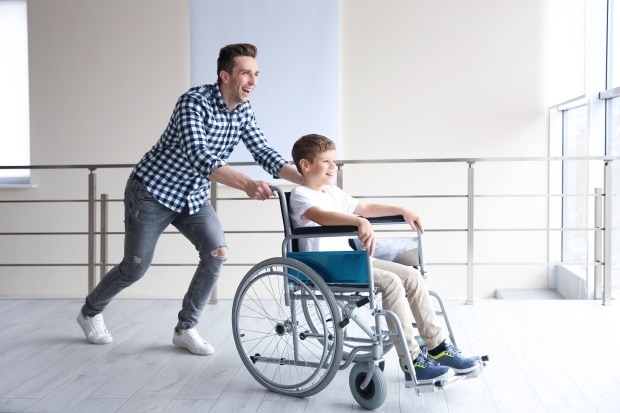Becoming A Stepparent To A Handicapped Child
Becoming a stepparent is a unique life experience. First, you must focus on cultivating a relationship with your new spouse.
Also, you must also find the proper balance between friendship and parenting a child with whom you share no similar DNA. However, the situation is different when the stepchild securing a place in your heart is handicapped.
- What should you expect?
- How do you approach and build the relationship?
- What needs to change?
There are so many questions and with these tips, you can step into the stepparenting role with confidence.
Knowledge is Power
Whether or not you’re already a parent to a child of your own, if you haven’t had any experience with a handicapped child, stepping into this new role can be a little daunting. Your spouse has already developed a routine and is an encyclopedia of information when it comes to the child’s specific disability.
Depending on the situation, your spouse may have been doing things on their own for years. Suddenly having an extra pair of hands will be an adjustment for both of you.
Communicate with your spouse about ways you can get involved. Be open about the emotions you are feeling.
You may find you’re going through a sort of mourning process as you adjust to the reality of the situation. And that’s okay.
You can’t control the future. However, you can educate yourself about your stepchild’s disability.
Ask questions of the child’s doctor, and attend appointments with specialists armed with questions and concerns.
While you should follow your spouse’s lead when it comes to general care, stepparents provide a unique perspective – your opinions matter.
Be Honest
You might feel as though you’re expected to jump right into the stepparenting role. However, it’s important you’re honest and clear with your spouse about what you are and aren’t comfortable doing.
If the child has medical needs or behavioral concerns, you may not feel comfortable being left alone until you have a little more time and experience under your belt.
Tracey Formosa, a mom to a child with special needs, has seen both ends of the step-parenting spectrum. Her ex-husband’s spouse doesn’t have children, while her new spouse has three; neither spouse had experience with a special needs child, so it was an adjustment for everyone.
If you do, then educate yourself and slowly build up the parental bond.
Make Adjustments
Becoming a stepparent requires you to open your heart, but you may have to open your home too. In doing so, adjustments and modifications are necessary to ensure the safety of your new stepchild(ren).
Your spouse will certainly be able to provide guidance in this area. As was discussed earlier, knowledge is power.
The modifications you make will depend greatly on the disability, but this guide walks you through ways to make your home accessible to children with visual impairments, sensory concerns, medical equipment, and wheelchairs.
Suggestions include widening entryways, installing handrails and grab bars, and sticking to neutral tones. Rather than tackle everything at once, prioritize the modifications and determine which are a necessity and which can wait a little bit.
While making adjustments, don’t forget about backyard safety. Consider widening sidewalks and adding handrails to increase accessibility and safety.
A fence around the yard or play area will provide peace of mind, and become a backyard safe haven where the two of you can play and bond.
Becoming a stepparent to a handicapped child is a life-changing experience for sure, but it’s nothing you can’t handle. Your spouse will be by your side every step of the way offering guidance and support.
By educating yourself about the disability, being honest about your feelings, and making modifications to ensure safety, you’re already ahead of the game. The Cerebral Palsy Family Network is a compassionate community that provides resources for loved ones with Cerebral Palsy.
As a parent of a child with special needs, you should learn more about financial planning and colleges for kids with special needs.
How was your experience becoming a stepparent to a handicapped child? Do have any other tips for stepparents building a relationship with a handicapped child? Please share them in the comments. Thank you.






